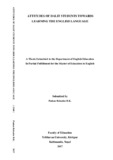Please use this identifier to cite or link to this item:
https://elibrary.tucl.edu.np/handle/123456789/1487| Title: | Attitudes of Dalit Students Towards Learning the English Language |
| Authors: | B.K., Padam Bahadur |
| Keywords: | English Language;Students;Research Methods |
| Issue Date: | 2017 |
| Publisher: | Faculty of Education Tribhuvan University, Kirtipur Kathmandu, Nepal |
| Abstract: | The present thesis entitled Attitudes of Dalit Students’ towards Learning English Language has major aim to find out the attitudes of dalit students towards learning English language. Keeping the objectives in consideration, twenty one dalit students from three different secondary schools, three English teachers from three different schools and six parents from three different dalit communities were sampled through non-random purposive sampling procedure. A set of questionnaire and a semi-structured interview schedule were the tools of data collection. After the analysis and interpretation of raw data, it was found that dalit students have positive attitudes towards learning English language. It has been found that the challenges faced by Dalit students‟ are caste based discrimination, poor family background which psychologically as well as physically affect in learning English. Those challenges are being also the causes of poor performance in English. It is also found that there is the close relationship between family background and English language learning. It means if there is poor family background it has negative impact on their study and if there is rich family background it assists in learning English. This thesis consists of five chapters. Chapter one is introductory part includes background of the study, statement of the problem, objectives of the study, research questions, significance of the study, delimitations of the study and operational definition of the key terms. Similarly, chapter two includes the review of the related theoretical literature, review of related empirical literature, implications of the review of the study and conceptual framework. Similarly, chapter three deals with methods and procedures of the study under which design and method of the study, population, sample and sampling strategy, study area, data collection tools and techniques, data collection procedures, analysis and interpretation procedures. Likewise, chapter four includes analysis and interpretation of results and summary of findings. In the same way, chapter five includes conclusions and recommendations. Recommendation includes; policy, practice and further research related areas. Finally, the references and appendices are included. |
| URI: | http://elibrary.tucl.edu.np/handle/123456789/1487 |
| Appears in Collections: | English Language Education |
Items in DSpace are protected by copyright, with all rights reserved, unless otherwise indicated.

